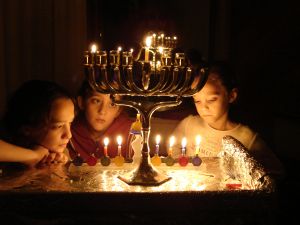 Chanukah in Jacksonville, Florida gives “Festival of Lights” a whole new meaning!
Chanukah in Jacksonville, Florida gives “Festival of Lights” a whole new meaning!
This is the time of year when many rabbis and Jewish educators dust off their “Christmas Dilemma” sermons or lessons. It isn’t difficult to understand why. Advertising for Christmas begins before Thanksgiving these days and in communities like Jacksonville, Florida, where the Jewish presence is (relatively) small, Chanukah rates barely a mention. But to me, this is not the time to lament that Chanukah, a minor rabbinic holiday, has been elevated into a major holiday in order to protect the North American Jewish psyche against the annual Christmas bombardment. What I’m more interested in is to take a moment to see what light this so-called “dilemma” sheds on how one deals with the dissonance between our shared cultural heritages. Because like it or not, Christmas, is not (only) a religious holiday, but an American holiday, and as such it helps us refine our understanding of what it means to have an “integrated” curriculum.
Christmas is almost an unfair example to take because regardless of which attitude towards “integration” a Jewish day school takes, it almost surely isn’t going to integrate the ideas and values of Christmas into its curriculum. However, if you take one aspect of Christmas in America (or Canada)—consumerism—you can see how complicated integration can be. Consumerism with its focus on individual material attainment is not consonant with Jewish values. So what is a Jewish day school to do with Chanukah in today’s world?
towards “integration” a Jewish day school takes, it almost surely isn’t going to integrate the ideas and values of Christmas into its curriculum. However, if you take one aspect of Christmas in America (or Canada)—consumerism—you can see how complicated integration can be. Consumerism with its focus on individual material attainment is not consonant with Jewish values. So what is a Jewish day school to do with Chanukah in today’s world?
Being “Jewish” and being “American” (or “Canadian” or wherever you may live) is not the same thing. However proud we legitimately ought to be of our dual identities, we are not being intellectually honest if we claim they are identical and never in conflict. [Please keep in mind that the choice not to choose between is itself a choice.] Celebrating the consumerist aspects of Chanukah without acknowledging their conflict with Jewish values is to claim that such a conflict does not exist. Although I am generalizing, Schechter schools adopt neither rejectionist nor assimilationist attitudes towards the secular societies of which they are a part. Nor do we feel so threatened by general society that we have to make everything Jewish. No, we strive to be interactionist—our philosophy which can be seen in everything from our curricula to our websites to our field trips—seeking to allow the Jewish and the general to interact naturally as it does in the real world.

So please, celebrate the historical and religious significance of Chanukah with joy, festivity, and yes, presents. But this Chanukah, let’s not forget our Jewish values of tzedakah (charity) and kehillah (community). Along with your normal gift-giving, consider donating a night or two of your family’s celebration to those less fortunate than ourselves. By doing so we send a powerful message that there are times when our Jewish values command us to reject the values of secular culture and that not only is that okay, but sometimes it is both necessary and appropriate.
Chag urim sameach from my family to yours!



